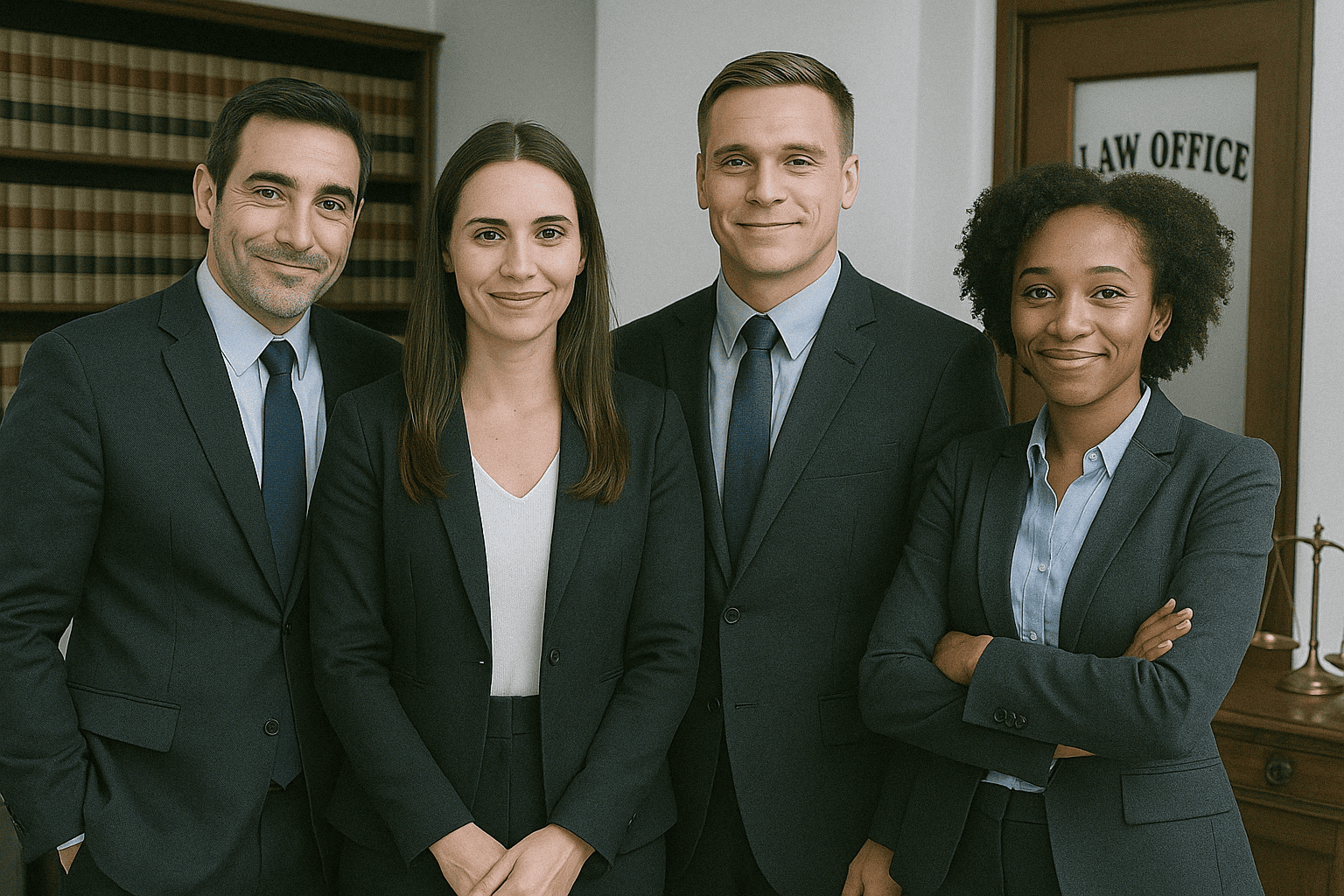Navigating the H-1B visa process can be daunting - from understanding employer obligations to filing error-free petitions amid changing regulations. That’s where a trusted H-1B visa lawyer comes in. Hiring the right attorney or law firm can make the difference between a smooth approval and a costly denial or delay. In this post, we’ll discuss why you might need an H-1B visa attorney, what to look for in the best H-1B visa law firm, and how tech and startup clients (especially in the U.S. and India) can benefit from knowledgeable legal counsel. We’ll also answer common questions like “Can I file an H-1B without a lawyer?” and “How do I find the best H-1B visa attorney for my case?”
Whether you’re a startup founder looking to sponsor your first international hire or an H-1B beneficiary wanting peace of mind, this guide will help you make an informed decision when choosing an immigration lawyer.
Why You Need a Specialized H-1B Visa Attorney
Complex Regulations: The H-1B visa is one of the most popular U.S. work visas, but it comes with complex rules. U.S. Citizenship and Immigration Services (USCIS) has detailed criteria for what constitutes a “specialty occupation,” required wages, and employer compliance. Regulations change over time - for example, in 2024 USCIS implemented new anti-fraud rules in the H-1B lottery registration and proposed higher filing fees. A specialized H-1B lawyer stays up-to-date on all these changes and guidance memos, so you don’t have to.
Paperwork and Precision: Preparing an H-1B petition isn’t just filling a form - it involves compiling a strong evidence package. A good H-1B visa lawyer will:
- Determine the correct occupational classification for the job.
- Advise on the prevailing wage and ensure the offered salary meets requirements.
- Craft a solid support letter explaining how the job qualifies as a specialty occupation and how the beneficiary meets the qualifications.
- Organize all supporting documents (education degrees, evaluation for foreign degrees, work experience letters, etc.) in the format USCIS prefers.
- Double-check for consistency and accuracy (even a small error in the form, like a typo in a passport number or a checkmark in the wrong box, can lead to delays or RFEs).
Avoiding Common Pitfalls: Did you know a significant number of H-1B petitions receive a Request for Evidence (RFE)? Common RFE triggers include: Level 1 wage issues, questioning if the job is really a specialty occupation, or if the beneficiary’s degree is closely related to the job. An experienced attorney preempts these issues by addressing them in the initial filing. For instance, if filing for an entry-level software engineer at a Level 1 wage, a great lawyer will include extra evidence (like a detailed expert opinion or industry data) to prove the job is still complex enough - heading off a potential RFE. While overall H-1B approval rates are high (around 98% in recent years), a skilled lawyer ensures your case isn’t among the unlucky few that get denied for avoidable reasons.
Strategy and Timing: Immigration law isn’t just forms, it’s strategy. A seasoned H-1B attorney will advise when to file (e.g., using premium processing or not), how to handle tricky situations (like if the H-1B worker will be placed at a client site - requiring detailed itineraries and perhaps an end-client letter), and what to plan for the long term. For example, they might suggest starting a green card process early to avoid the six-year limit issue, or counsel on maintaining status if any gap arises. This strategic guidance is especially crucial for startups, which may not have a full HR compliance team.
Handling the H-1B Lottery: Getting an H-1B often starts with the lottery registration. A good H-1B visa law firm will manage bulk registrations for a company efficiently (making sure each employee is entered correctly, avoiding duplicate errors that could invalidate entries). If selected, they seamlessly transition to preparing the petition. If not, they’ll be ready with alternative plans or cap-exempt H-1B ideas. Essentially, your lawyer becomes a partner in managing your workforce’s immigration needs year-round, not just a paper-pusher.
Qualities of the Best H-1B Visa Law Firm
Not all immigration lawyers are created equal. Here are key qualities and services to look for when choosing the best H-1B visa attorney for your needs:
- Expertise in H-1B and Employment Visas: Ensure the lawyer or firm has deep experience specifically with H-1B visas (and related categories like L-1, O-1, etc.). Ask how many H-1B cases they handle annually. An attorney who mainly does, say, family green cards or asylum may not be as versed in the nuances of H-1Bs for tech workers. You want someone who lives and breathes employment immigration. Look for credentials like AILA (American Immigration Lawyers Association) membership, or accolades in immigration law. Many top H-1B attorneys will publish articles or updates on H-1B trends - that’s a good sign of their engagement with the subject.
- Track Record of Success: While past success doesn’t guarantee future results, it’s reassuring to know the firm has a high approval rate. You might ask, “What was your H-1B cap petition approval rate last year?” Top firms often tout success rates above 95%. Also, check for testimonials, reviews or case studies. If you find reviews saying “this firm saved my H-1B after an RFE” or “they handled 20 H-1Bs for our startup flawlessly,” that’s a great indicator.
- Responsiveness and Timeline Management: The H-1B process is very time-sensitive (especially around the lottery and filing window). The best H-1B law firms have systems to manage deadlines and keep you updated. Do they remind you of upcoming expiration dates or milestones? Do they use a case management portal where you can see progress? You’ll want a lawyer who responds to your questions promptly and doesn’t leave you in the dark - after all, your career plans may hinge on this visa. In your initial consultations, gauge their responsiveness. If they’re slow to reply when trying to win your business, that could be a red flag.
- Personalized Attention: Avoid mills where you’re just a case number. While big immigration firms handle thousands of cases, sometimes you get better service with a boutique firm that limits their caseload. The best attorneys will take the time to understand your specific situation - e.g., if you’re a startup, they’ll know how to position a job that might not have an industry standard title, or if you’re a candidate with an unconventional background, they’ll proactively address that. Ask if the firm has experience with startups or your industry. A lawyer who understands the startup/tech ecosystem can communicate your case effectively to USCIS, translating what you do into terms that meet the legal criteria.
- Transparent Fees: Let’s address cost - good legal help isn’t cheap, but it’s a worthy investment. Still, you should know what you’re paying for. H-1B visa attorney fees can range widely. Based on industry norms, an average H-1B lawyer fee might be around $2,500 - $5,000 for a cap petition (plus the required government filing fees). Top law firms might charge more, especially if the case is complicated. Be cautious of deals that sound too good to be true (e.g., someone offering to do it for $500 - they might be cutting corners or not really attorneys). Also avoid “consultants” who are not licensed lawyers; only attorneys (or accredited representatives) can legally provide immigration advice. The best H-1B law firms will provide a clear fee agreement, outline what’s included (e.g., responding to an RFE might be included or may cost extra), and be upfront about additional costs (like translation fees, FedEx, etc.). They will also not gouge you - high quality doesn’t mean absurdly overpriced.
- Support for International Candidates: If you (the beneficiary) are overseas, a good H-1B lawyer will guide you through the consular visa stamping process too. This is important for Indian H-1B applicants who often face long wait times for visa appointments. The firm should prepare you for the consular interview, provide documentation for any 221(g) administrative processing issues, and generally be with you until you actually enter the U.S. Also, if you have a spouse and kids, a full-service firm will handle the H-4 visas in parallel and even H-4 EAD work permits for spouses when eligible. Essentially, a “one-stop shop” for your immigration needs adds a lot of value and convenience.
- Diligence and Integrity: Lastly, the best attorneys play by the book. They won’t engage in fraudulent practices (like fake job offers or degrees). Steer clear of any lawyer suggesting unethical shortcuts - if it sounds wrong, it probably is. The consequences for misrepresentation in an H-1B can be severe (denials, revocations, even bans). Reputable lawyers uphold the law and their clients’ trust.
People Also Ask: H-1B Visa Lawyers
Q: Do I really need a lawyer for an H-1B visa, or can I file it myself? A: In theory, an employer (company) can file an H-1B petition without hiring a lawyer. However, it’s generally not advisable unless the employer’s HR is very experienced with H-1Bs. The process is detail-heavy - the employer must file a Labor Condition Application with the Department of Labor, then prepare the USCIS petition forms and supporting documents. Mistakes can be costly. Many employers, especially startups or those new to H-1Bs, don’t want to take the risk of a denial due to a technicality. Having an H-1B attorney ensures the petition is done correctly and complies with all legal requirements. Also, some scenarios can be tricky (e.g., if the candidate will work at multiple client sites, or has a foreign degree needing equivalency). A lawyer handles those complexities. Considering the relatively small cost of legal fees compared to the importance of the outcome (the employee’s ability to work and live in the U.S.), most find it well worth it. Bottom line: While it’s possible to DIY an H-1B, it’s a high-stakes gamble - most companies and individuals use a qualified immigration lawyer to maximize success.
Q: How do I choose the best H-1B visa attorney for my case? A: Start by researching immigration lawyers or firms that specialize in employment visas. You can ask for recommendations (for example, other startup founders or foreign colleagues who got their H-1Bs can refer you to who they used). Look at the firm’s website - do they mention H-1B expertise or have informative content? That often reflects their proficiency. Schedule consultations with a couple of attorneys (many offer an initial consultation, sometimes free or low-cost). During the consultation, ask about their experience with similar cases. For instance, “Have you handled H-1Bs for software engineers at startups?” or “Do you have many clients from India on H-1B?” (since they’ll understand any cultural/document nuances). Gauge if the attorney communicates clearly and patiently addresses your questions. Check if they have a team - paralegals, etc., and how accessible they will be. Also discuss fees up front to avoid surprises. You might also check online reviews on Google or sites like Avvo. However, take reviews with a grain of salt and focus on the substantive feedback. Ultimately, choose a lawyer you feel comfortable with and trust - someone who demonstrates knowledge, professionalism, and genuine interest in helping you.
Q: What should I expect during the H-1B process with a lawyer? A: Once you hire an H-1B lawyer, they will usually send the employer and employee a detailed list of needed information and documents. For example, the company will provide details about the job (title, duties, salary, work locations) and company info (tax ID, financial info if required), and the beneficiary will provide personal documents (passport, degrees, resume, prior immigration documents). The lawyer (or their team) will then file the Labor Condition Application (LCA) online - this takes about 7 days to get certified. After the LCA, they’ll compile the petition and send you a draft for review or questions. Reputable lawyers will double-check everything with you before filing. After filing, they’ll inform you when the USCIS receipt notice comes and track the case. If there’s an RFE, they’ll handle drafting a strong RFE response (often involving you and the company to gather additional evidence). They’ll keep you posted on the case status until a decision comes. Good firms also assist with what happens post-approval - for instance, advising on travel, H-1B stamping at the consulate (providing documentation for that), and reminding you of future deadlines (like H-1B extensions or amendments if you get promoted or change work site). Essentially, expect a partnership where the lawyer guides you at each step and you provide the needed inputs.
Q: My employer has its own lawyer, should I get my own attorney on the side? A: Typically, the employer’s attorney handles the H-1B petition because the H-1B is technically the company’s application (the company is the petitioner, you are the beneficiary). In most cases that’s perfectly fine - the lawyer represents the company but also is working in your interest to get the H-1B approved. If you trust that the company’s lawyer is competent, you usually do not need to hire a separate lawyer for yourself. However, there are scenarios where the company’s attorney may not communicate directly with you or you want independent advice - for instance, if you have personal immigration issues to discuss (like a prior visa overstay or plans for future green card) that you prefer not to involve your employer. In such cases, you can consult another immigration attorney confidentially for personal guidance. But having two lawyers file the same H-1B petition would be redundant and could cause confusion. Generally, use one designated attorney to submit the petition to USCIS. If you do seek a second opinion, be transparent that someone else is handling the actual filing. Most often, it’s best to work with the company’s lawyer, and reputable company lawyers will also treat you, the beneficiary, with due care - answering your questions and making sure you’re comfortable, since they know the outcome affects you greatly.
Q: What if my H-1B petition gets a Request for Evidence (RFE) or denial despite using a lawyer? A: While a good lawyer minimizes the chance of RFEs or denials, they can still happen. If you receive an RFE, your lawyer will help draft a thorough response, as mentioned. Many RFEs are overcome with a strong reply (e.g., providing an expert opinion letter, more detailed project documentation, etc.). USCIS ultimately makes the decision. If, worst-case, an H-1B is denied, a top attorney will discuss next steps: possibly appealing or filing a Motion to Reopen/Reconsider if there were mistakes in the decision. However, given the typically short timeline in H-1B cap cases, often the practical approach is to regroup and refile in the next cap season or pursue an alternative visa in the meantime. Your lawyer might advise on options like cap-exempt H-1B (if eligible) or others as discussed. Importantly, if a denial happens, a good law firm will often either not charge for a re-file or heavily discount it, depending on circumstances - especially if the denial was due to an error on their part (which is rare if you chose well). Make sure you understand the firm’s policy on RFEs and denials (some include RFE responses in the initial fee, others charge extra; some will handle an appeal for an additional fee). The goal of the lawyer is the same as yours: an approval. The best lawyers take denials personally and will go the extra mile to turn it around if possible.
How Gale Can Help with Your H-1B (A Friendly Pitch)
At Gale (a YC-backed immigration service for tech/startup clients), we pride ourselves on not just having a network of independent experienced lawyers, but also being partners in your success. Our approach as an immigration platform includes:
- Personalized Service: We assign a dedicated independent attorney in our network to your case who gets to know you and your company’s needs. You won’t be passed around call centers or have your questions ignored. We know most of our clients by name and love hearing about their new startups and careers - it motivates us to do our best work.
- Startup & Tech Expertise: Our network of independent immigration attorneys have successfully filed H-1Bs for roles ranging from AI researchers to product managers to software engineers at seed-stage startups. We understand venture funding, equity compensation, and how to convey cutting-edge tech roles to immigration officers who may not be tech-savvy. For example, if you’re working on blockchain or quantum computing, independent attorneys in our network help translate that into a solid H-1B petition narrative that fits USCIS criteria.
- End-to-End Support: Gale's platform, combined with our network of independent attorneys, handle everything from H-1B cap registration to petition filing, to prepping you for visa stamping (we even do mock visa interviews for first-time travelers). If you need to change employers or file extensions later, our platform and network have got you covered then, too. And if you eventually aim for a green card, we’ll work together with independent attorneys to ensure your H-1B strategy dovetails into that long-term plan (whether it’s via EB-2/EB-3 or EB-1 for extraordinary researchers, etc.).
- Transparent Flat Fees: We operate on flat-fee pricing for H-1Bs, so you know the cost upfront. No billing surprises. Our fee includes responding to any RFE at no extra charge because we stand by our work. If your company is sponsoring multiple H-1Bs, we offer discounted bundle pricing. We know startups are cost-conscious, so we strive to provide top-tier service efficiently.
- Accessible and Friendly: We are approachable. We explain things in plain English. Immigration is stressful; our job is to make it easier. You’ll often find us sharing the latest immigration news on LinkedIn or writing articles to help demystify the process. We believe an informed client is an empowered client.
Choosing an H-1B visa lawyer is an important decision. Take your time to vet and select someone who instills confidence. It can save you headaches, time, and even money in the long run by getting your petition approved faster and avoiding pitfalls. In the fast-paced tech world, you want to spend time building your product - not worrying about immigration paperwork. The right lawyer takes that burden off your shoulders.
Conclusion
In summary, yes, you likely need an H-1B visa lawyer - and choosing a qualified, trustworthy H-1B attorney will pay dividends in a smoother process and peace of mind. Look for expertise, a strong track record, good communication, and someone who understands your specific context (like startup life). While you focus on your code, research, or business plan, let a seasoned lawyer focus on getting your visa status secured.
If you’re in the tech or startup field and seeking an H-1B, consider reaching out to our team at Gale. We combine legal excellence through a network of independent attorneys, with a modern, client-focused approach. We’ve been in your shoes and we’re here to guide you at every step.
Get in touch for a consultation and let’s chart the path to make your American Dream a reality. As we often say, “Immigration law is complex, but with the right partner, you don’t have to navigate it alone.”
Disclaimer: This article is for general informational purposes and does not constitute legal advice. Consult with an immigration attorney for advice on specific situations.




